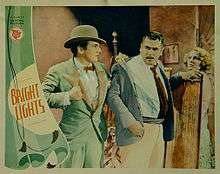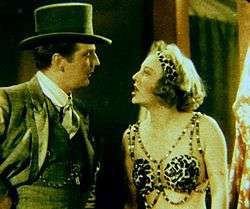Bright Lights (1930 film)
| Bright Lights | |
|---|---|
 Theatrical release poster | |
| Directed by | Michael Curtiz |
| Produced by | Robert North |
| Written by |
Scenario & dialogue: Henry McCarty Humphrey Pearson |
| Starring | |
| Music by | |
| Cinematography |
Lee Garmes Charles Schoenbaum (Technicolor) |
| Edited by | Harold Young |
Production company | |
| Distributed by | Warner Bros. |
Release dates | September 21, 1930 |
Running time | 73 minutes (7 Reels) |
| Country | United States |
| Language | English |
Bright Lights is a 1930 American Pre-Code musical comedy film photographed entirely in Technicolor and produced and released by First National Pictures, a subsidiary of Warner Brothers. Although filmed in December 1929, the film sat on the shelf until the autumn of 1930 when it was given a limited release. However, Warners quickly withdrew the film when the studio realized that the public had grown weary of musicals. Warners believed that this attitude would only last for a few months, but, when the public proved obstinate, they reluctantly re-released the film early in 1931 after making a few cuts to it. The film stars Dorothy Mackaill, Frank Fay, Noah Beery and Frank McHugh. It also features the screen debut of John Carradine, who appears in a small uncredited role.
Plot
Successful actress Louanne (Dorothy Mackaill) is about to marry a rich man instead of the man she really loves, Wally Dean (Frank Fay). As the film begins, Louanne is giving her last performance as she plans to retire once she is married. A group of reporters comes to interview Louanne and while she tells them a story which she thinks is appropriate for a soon-to-be wife of a wealthy socialite, the scene flashes back to her actual past.
It is revealed that Louanne was once a dancer at a low-class cafe. Portuguese smuggler Miguel Parada (Noah Beery), took an interest in her and attempted to force his affections on her. Wally Dean, who was, even then, her constant companion, manages to escape with her from the cafe as a riot is about to start. Another flashback shows Wally as a barker at a carnival with Louanne as a dancer. Again Wally saves Louanne from an imminent riot. Back in the present, Louanne continues to lie to the reporters and tell them about her genteel background.
Fish (Frank McHugh), one of the reporters, does not believe her story but says nothing. When Louanne returns to the stage to resume her performance, Miguel, who happens to be in the audience, recognizes her and goes to her dressing room because he has some "unfinished business" with her. Louanne enters her dressing room and is shocked to find Miguel. Wally soon appears and pretends he has a gun to intimidate Miguel; he gives the "gun" to Connie Lamont (James Murray) because he has to go on stage. While Connie is guarding Miguel, a fight erupts between the two and Miguel reveals that he has a real gun. In the struggle for it, Miguel is shot and he dies.
When the police arrive, Wally tries to convince the police that Miguel committed suicide to save Louanne from a scandal before her marriage. Louanne's friend Peggy (Inez Courtney) also gives false testimony to save her. The police remain unconvinced until the reporter, Fish, gives false testimony that he actually saw Miguel pull the trigger. Louanne is cleared and realizes that she really loves Wally. She cancels her engagement to her rich fiancé and is united with Wally.
Cast
|
|
Songs
|
|

Preservation status
Only a black-and-white copy of the cut print released in the United States in 1931 (with some of the musical numbers cut) seems to have survived. The complete film was released intact in countries outside the United States where a backlash against musicals never occurred. It is unknown whether a copy of this full version still exists. Recently, a small fragment in the original Technicolor, running about three minutes, was discovered in the Library of Congress.[1] In 2012 the film became available on DVD from the Warner Archive in a double-bill with another Dorothy Mackaill talking film, The Reckless Hour.
See also
References
External links
- Bright Lights (1930) at the Internet Movie Database
- Synopsis, allrovi.com